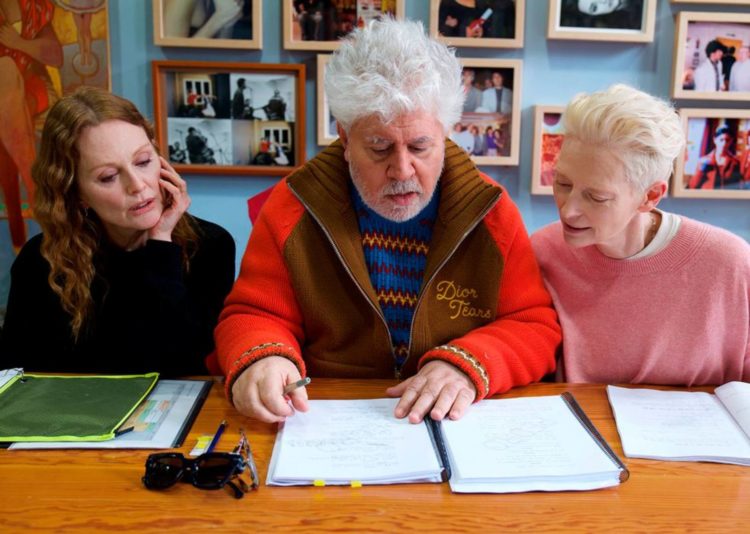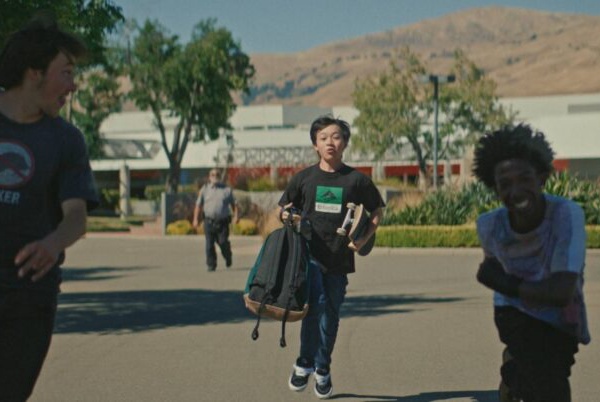

Huang Xi’s Daughter’s Daughter is, as the title suggests, a generational drama, but one that encompasses four generations of women rather than just two. In fact, the central story is almost exclusively centered on women; male characters are largely referred to only passively, vaguely in conversation. It’s a choice that allows the film to touch on the varied dynamics of mothering, independence, and difficult choices in the lives of the very young and old women of this Taiwanese family. It also allows for women to critique women, mothers to critique daughters, and vice-versa without the typically ubiquitous presence of men in these scenarios. It almost plays like a contained thought experiment running underneath a classic dilemma about what to do with an unborn child.
The central figure Jin Aixia (Sylvia Chang, who also produced the film alongside Hou Hsiao-hsien), is at once steadfast in her independence but quickly flustered at almost the slightest disruption and presence of her two daughters Fan Zeur (Eugenie Liu) and Emma (Karena Ka-Yan Lam). They were born far apart and never met until they were adults. Zeur is a lesbian who grew up in Taipei; Emma is much more “Americanized,” having spent most of her life in New York. Jin is the only connection between them, and she exudes the weight of holding that burden of distance and estrangement. She is also the connection between them and their grandmother Shen Yan-hua (Alana Ong) who is suffering from a gradual onset of dementia. When she finds out about Zeur’s death in a car crash and Zeur’s embryo left behind in her custody, her world is turned upside-down.
Chang’s performance is appropriately delicate. She expresses a level of outwardness about her character’s own confusion that toes the line between insecurity and a need for control over her situation. When Jin is informed about the embryo, Chang turns the character into a fumbling mess, her mind racing and interrupting the doctor’s explanations with a completely aimless line of questioning. Her hands tremble any time she holds remembrances of Zeur, like photographs or her daughter’s old toiletries. Through flashback sequences, Huang shows Jin has dissonant personalities and, in the relationship between mother and daughter, Zeur’s more rebellious personality is at odds with her mom’s interloping nature. In a scene at the gynecologist, Jin instinctively stands behind the doctor as she does her inspection, to which Zeur has to forcefully remind her mother of the breach of privacy.
Jin and Emma’s personalities don’t quite gel, either. Jin becomes anxious, nervous, and unfocused after the death of Zeur, but Emma pressures her to make a decision about the embryo quickly. The latter’s practical-mindedness comes across as cold to Jin’s confused passion. The disjointed relationships between mothers and daughters form a cycle in the film; Jin’s decision with the embryo becomes an internal re-litigation of her own decision not to be that present in Zeur or Emma’s lives, while Emma is often pictured out-of-focus in the foreground.
Huang’s style is decidedly understated, consistently composing the film in medium shots. A few break the mold (e.g. one jarring still shot from inside a washing machine) but there is a clarity and cleanness to the camera movements; this lack of intrusion gives the film a bit of a flat, lethargic feel, despite the high drama supposedly happening to the characters. What emotion does come through the camera and within the frame tends to be too obvious. When Emma and Jin are arguing about the embryo on the street in New York, the camera pans to follow a child crying in its stroller.
This is where Chang’s performance maintains the film’s overall interest. She perfectly exudes the balance of self-centeredness and self-pity that frustrates those around Jin. She continually opines out-loud about giving the embryo away and sending her own mother off to a hospital and “living a quiet life by myself” which ruffles Emma, who snaps back, “Can you ever think of anything but yourself?” Daughter’s Daughter plays it safe to a level where it basically requires Sylvia Chang’s wonderful performance to lift it up.
Daughter’s Daughter premiered at the Toronto International Film Festival.
The post TIFF Review: Sylvia Chang’s Wonderful Performance Lifts Up Daughter’s Daughter first appeared on The Film Stage.



